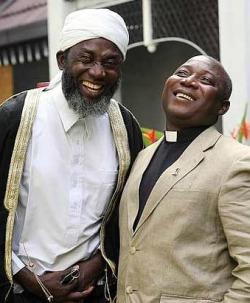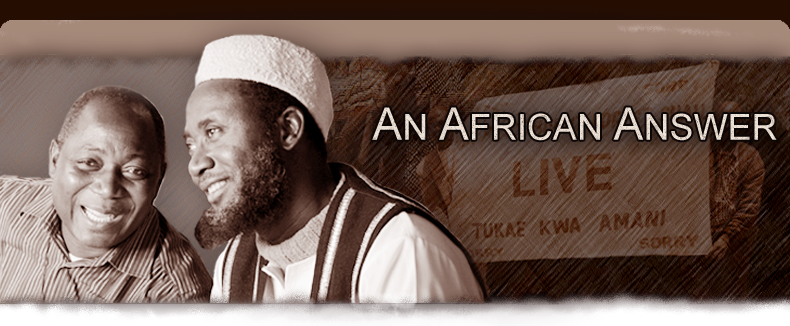 Renowned Nigerian peacemakers Imam Muhammad Ashafa and Pastor James Wuye visited Malaysia, 22-26 November, as guests of Initiatives of Change in partnership with other local organizations. During their visit they met the Malaysian Prime Minister and other politicians, as well as having discussions with religious leaders and interfaith organizations. Their visit attracted considerable media coverage.
Renowned Nigerian peacemakers Imam Muhammad Ashafa and Pastor James Wuye visited Malaysia, 22-26 November, as guests of Initiatives of Change in partnership with other local organizations. During their visit they met the Malaysian Prime Minister and other politicians, as well as having discussions with religious leaders and interfaith organizations. Their visit attracted considerable media coverage.
The two men were once sworn enemies, leading opposing militia groups during the tensions between Christian and Muslim groups in the 1990s which saw thousands killed or displaced. They now lead the Interfaith Mediation Centre in Kaduna, Northern Nigeria, working for peace in their own country and beyond. The story of their journey of reconciliation is told in The Imam and the Pastor by IofC’s FLTfilms. A further documentary, An African Answer, which focusses on their efforts to bring peace in Kenya’s Rift Valley after the tribal violence in early 2008 was launched recently in Kenya and in London.
A welcome reception on their arrival in Kuala Lumpur gave a chance for the imam and pastor to meet 40 of the team who had prepared their visit, including representatives of Sisters in Islam, the Oriental Hearts and Minds Studies Institute, the Interfaith Spiritual Fellowship and MRA/IofC Malaysia.
The next day, they were welcomed by the Anglican Bishop of West Malaysia in the offices of the Christian Federation of Malaysia, which comprises the Roman Catholic Church, the National Evangelical Fellowship and the Council of Christian Churches. The 22 Christian leaders present included the Archbishop of Kuala Lumpur. After a presentation by the Nigerians, there was a spirited time of questions and answers touching on hot topics such as the use of the word ‘Allah’ by non-Muslims and the issue of how to relate to power. Here, as elsewhere, the imam and pastor urged the pursuit of dialogue, which was always better than violence.That evening the pair met noted public intellectual Dr Chandra Muzaffar, Professor of Global Studies at University of Sains Penang and President of the International Movement for a Just World. They were joined by Dr Amir Farid Dato Ishaak, Chairman of the Interfaith Spiritual Fellowship and a member of the Inter-Religious Committee in the government Department of National Unity.
The following day saw a chance for dialogue with Members of Parliament from government and opposition benches in Parliament House before meeting Hon. Koh Tsu Koon, a Minister in the Prime Mininster’s department. A short discussion with the minister was followed by a joint press conference where Imam Ashafa told journalists that although he and Pastor Wuye differed on some theological issues, they were determined to contribute to the making of a safer world. He observed that ‘Malaysia's strength is in its diversity, especially in maintaining religious and racial relationships’. The Minister said that Malaysia should emulate measures taken by the two Nigerians in making relations between religions and races stay harmonious. The Minister then took the visitors to a short meeting with Prime Minister Najib Tun Razak.
A public reception that evening drew over 200 guests to hear the two peacemakers share their experiences, hosted by Dato Muhammad Iqbal of the Islamic Education Foundation. The event was filmed and excerpts shown on Malaysiakini, a leading internet news portal.
During their visit the Nigerians also met with Prof. Hashim Kamali, and other staff at the Institute of Advanced Islamic Studies; the Malaysian Consultative Committee for Buddhism, Christianity, Sikhism and Taoism; and the Chairman and other members of the Inter-Religious Committee of the government’s Department of National Unity, where they shared their own experiences working with the Nigerian Inter-Religious Council and offered to help with capacity-building. They also ran a training session, with funding assistance from the Interfaith Spiritual Fellowship, teaching 40 people to faclilitate programmes using the DVD’s The Imam and the Pastor and An African Answer.
Their visit was widely covered by the media throughout, starting with an announcement of their visit on the main evening news on channel TV3 on the day of their arrival, and including TV and radio interviews, a report in the New Straits Times and a three-hour interview in The Star – Malaysia’s leading English language newspaper.
Speaking to The Star, Imam Ashafa talked about three types of religious leaders who he called ‘the good, the bad and the ugly’. The ‘good’ were the ideal leaders who follow the principles of their religion and go beyond greed and fear. The ‘bad’ were incapable religious leaders who lacked the experience or the wisdom to contexualise religious scriptures. ‘It is the context that determines the rules of engagement. But these people have no wisdom or experience to be able to differentiate in which context what scripture applies.’ Out of ignorance, they ‘find it easy to demonize the other with scriptural text and they have been able to mislead hundreds and thousands of followers.’ Such leaders were sincere, but ‘sincerely ignorant’ said Ashafa. The third group were the ‘ugly’, who may have encyclopeadic knowledge of scripture but are ‘possessed by greed, poverty, ego and the fight for glorification, so they eat and dine with mischievous political leaders who have no vision or passion or virtues’. These ‘ugly’ leaders would ‘quote and misquote scripture, and glorify violence and hatred of the other.’
Ashafa confessed that he himself had fallen into the hands of incapable and mischevious leaders before discovering that ‘the powerful weapon used by Prophet Mohamed was the power of forgiveness... You re-humanise your enemy and give him a second chance. If you do that then you are the true embodiment of the Islamic tradition.’
